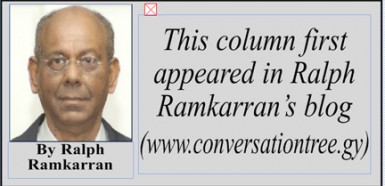 The Guyana Chronicle, which obtained Justice Franklin Holder’s letter to the Chancellor (ag), the Hon Yonette Cummings-Edwards, complaining about the conduct of the Attorney-General and Minister of Legal Affairs, the Hon Basil Williams, during the hearing of a matter in court on March 23, tried its best to obfuscate. The letter has now been published and Justice Holder’s searing comments are in the public domain.
The Guyana Chronicle, which obtained Justice Franklin Holder’s letter to the Chancellor (ag), the Hon Yonette Cummings-Edwards, complaining about the conduct of the Attorney-General and Minister of Legal Affairs, the Hon Basil Williams, during the hearing of a matter in court on March 23, tried its best to obfuscate. The letter has now been published and Justice Holder’s searing comments are in the public domain.
This less than professional reporting by the Guyana Chronicle was probably the reason why the Judge’s letter found its way to other sections of the media. The Judge described Mr Williams’s conduct as “despicable” and “contemptuous.” The Judge said, quoting his letter from the Stabroek News: “I am not prepared to sit and hear Mr Williams as an attorney-at-law in any matter whatsoever, unless he makes a genuine and meaningful apology to my satisfaction, in open court, both to me and to members of the Bar since they too were scandalized by his despicable conduct.” The Guyana Chronicle, which claimed to have had the Judge’s letter, reported none of this.
From the initial public disclosure of the matter by Mr Anil Nandlall, former Attorney-General, against whom Mr Williams was engaged in the case before Justice Holder, the statement that attracted the most interest was Mr Williams’s reference to a Magistrate who was the last person who told him what he should say “and he is now dead.” It came across as if Mr Williams was threatening the life of the Judge, which Mr Williams has denied. He said that “the allegation that I threatened to kill him, and all that nonsense, that is not so…” But while the Judge mentioned the statement in his letter, his complaint was rather about what appeared to be a rather rash statement, to put it mildly, made by Mr Williams at the end of the exchange. The Judge’s letter reportedly said: “This was followed by a most egregious statement by Mr Williams, which is: ‘I could say what I want to say and when I want to say it. I have always been like that.’”
Mr Williams has given two interviews to the media on the matter. In both he has blamed Mr Nandlall’s alleged interruptions during the hearing. Mr Williams said: “We can’t allow Nandlall to create this problem and then we leave it unresolved…Nandlall is the one who caused the problem for three hours…” Mr Williams has accused Mr Nandlall of “iniquity” and suggested that the Judge’s reaction against him was one of “transferred frustration.” The Judge, who seemed unaware of this highly innovative concept, denied Mr Williams’s allegation against Mr Nandlall. Mr Williams suggested that “the judge and I will resolve the issue” and “we will work with the Judge.” Regarding an apology, he said “I don’t know about apology.”
There are rules about the behaviour of lawyers in court. The Judge could there and then have cited Mr Williams for contempt in the face of the court, as he indicated in his letter. To do so he would have had to inform Mr Williams that he was charging him with contempt, state the particulars of his conduct which amounted to contempt and invite him to answer the charge. Mr Williams could have answered it then, or ask for an adjournment to mount a defence, or plead guilty, later. If Mr Williams pleads or is found guilty, he could have been fined or worse, imprisoned.
The Legal Practitioners (Amendment) Act 2010 Rule VII (3) states that “an Attorney-at-Law shall treat the court with courtesy and respect…” Rule VII (5) states that “Attorney-at-Law shall not exchange in angry verbal exchanges in Court even if made soto voce.” Section 34(2) states: “An Attorney-at-Law who breaches the code of conduct counts as an act of professional misconduct.”
Mr Williams, a highly visible public figure holding one of the most important positions in government, can avoid the sanction of the Judge by not appearing before him again, but this is not an option for a person holding his offices and especially since the matter has reached the Chancellor (ag) and the President. Since a private apology is now out of the question because the Judge’s letter demanding an apology in open court is in the public domain, Mr Williams could now be forced to consider a public apology. Failing this, the Chancellor (ag) can convene the Full Court and set in motion the process to hear a complaint of misconduct against Mr Williams. The Full Court can impose a penalty as severe as disbarment.
The President has no business in how the courts treat with the matter or in mediating an outcome, although, representing the government, which is Mr Williams’s client, the President may suggest a course of conduct to Mr Williams. Even if the matter is concluded to the satisfaction of the Judge, the President may have additional, political, concerns.
A long time ago Mr Williams and I exchanged sharp and angry words before a Judge in open court. We were both wrong because we both participated. The next time I saw Mr Williams in the Supreme Court corridor, he approached me with outstretched hand. He can bring this matter to an end.





